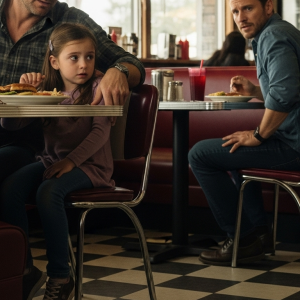My name is Clara. For the past six years, I’ve been in a relationship with a man named Finn. Six years of what I believed was love, loyalty, and a whole lot of my patience. When I say patience, I mean I have been the one supporting him financially while he bounced between a series of increasingly delusional “passion projects.”
There was the YouTube channel, where he was certain he’d be bigger than PewDiePie. It never took off, despite the expensive vlogging camera I bought him for his birthday. Then came the NFT craze, where he swore he was “ahead of the curve.” Spoiler: he wasn’t. He was just out a few thousand dollars of my money. His most recent venture was a brief, disastrous stint in crypto, where he managed to lose most of his own meager savings and then looked to me to “help him recover.”
Throughout all of this, I held us down. The mortgage on our house? That was me. The utilities, the groceries, the car payments? All me. Finn was the dreamer, the visionary, the artist. I was, I guess, the fool who kept funding the dream. Every time he’d come to me with a new idea, his eyes bright with that infectious, boyish enthusiasm, I’d push down my doubts and write another check. “This time will be different, Clara,” he’d say. And like an idiot, I always believed him.
Things started getting weird about two weeks ago. Finn began acting distant, spending more time than usual glued to his phone, a secretive smile on his face. He started making odd comments about needing “space to grow” and “finding himself.” I didn’t think much of it at first; he tends to get philosophical right before he dives into another financially ruinous project.
But then he started making comments about the state of the house, which was new. He’d point out unwashed dishes in the sink or a basket of unfolded laundry with a weirdly judgmental tone I’d never heard from him before. This, from a man whose main contribution to household chores was reorganizing the bookshelf by genre three times and throwing out my perfectly good Tupperware because it “didn’t spark joy.”
Last week, he sat me down at our kitchen table after I got home from my 10-hour shift. He had a serious look on his face, one I’d only seen a few times before—usually when he was about to announce that another of his ventures had failed. But what came out of his mouth made me question if I was living in some bizarre parallel universe.
“I think we should break up,” he said, his expression grave.
I waited for the punchline. There was none. I asked him why.
He took a deep breath, as if preparing to deliver a difficult but necessary truth. “You don’t do enough around the house.”
I actually laughed. A real, disbelieving laugh. He couldn’t be serious. But when he didn’t even crack a smile, I felt something inside me just… shift. This man, whom I have essentially been mothering for six years, was accusing me of not contributing enough.
When I asked him to clarify, he doubled down. “You never clean up after yourself. I feel like I do all the emotional labor around here. I’m always the one who has to point out when things need to be done.”
Let me paint you a picture. I work insane hours as a project manager to keep us afloat. Yes, sometimes I’m too tired to do the dishes right after dinner. Sometimes I leave my coffee mug on the counter. But I also pay every single bill that keeps a roof over our heads and food in our fridge. This is the same man who has a complete meltdown if the Wi-Fi goes out for more than five minutes, and guess who has to call the provider every single time? Me.
But here’s where it got truly bizarre. After his little breakup announcement, Finn started acting as if the house was already his. He made a smug comment about how this would be a “good reset for both of us” and suggested I could move back in with my mom. He even started talking about how he was going to turn the guest room into his new office once I was gone, and how he might get a dog since there “won’t be anyone to complain about the hair anymore.”
That’s when it hit me. He genuinely seemed to have forgotten—or maybe never realized—whose name is actually on the deed to this house. Hint: it’s not his. This house was my inheritance from my grandparents. I am the sole owner. Every mortgage payment, every repair, every utility bill—it’s all in my name.
I excused myself, went upstairs, and locked myself in our bedroom. I wasn’t going to argue. No, I was going to let him sit in his little delusion. Let him think he was winning. Because Finn had no idea what was coming. He had no clue that he was about to lose everything.
The week following the breakup was a masterclass in audacity. Finn acted like he had won the lottery. He lounged around the house like the king of a castle he hadn’t even built, let alone paid for. He left messes everywhere, played his video games until 4 a.m., and would occasionally give me pointers on what I “needed to pack up” so I could leave in an orderly fashion.
I just watched, a silent observer in my own home, waiting to see how far this delusion would go. Spoiler: it went very far.
About a week after the breakup, Finn informed me, without looking up from his phone, that he was having a friend over. “Just so you know,” he muttered, “I need you to respect my space.”
His space. In my house. Sure, buddy.
When the doorbell rang, I opened it to find a woman standing there with a bright smile and a bottle of wine. Her name was Mila. She was perfectly nice, polite even, but it didn’t take a detective to figure out this wasn’t just a friend. The way she looked at Finn, the way he immediately put his arm around her… they were very much together.
Finn didn’t even introduce us properly. He breezed past me like I was the maid and began giving Mila a grand tour of the house. My house. And oh, did he sell it. He was like a real estate mogul showing off his prize property.
“This is the living room,” he announced grandly. “I’ve been thinking about getting a new couch in here, something more modern, you know?”
“This is the kitchen. I love the open layout. It’s great for hosting.”
“And this,” he said, opening the door to the spare bedroom, “is my office. It’s where I do most of my work these days.”
I almost choked. Work? The man hadn’t held a steady job since 2018. That “office” was mostly where he played Fortnite and brainstormed his next failed venture.
Mila was eating it up, though. I could see her imagining herself living here, settling into a life of Pinterest-perfect bliss. Meanwhile, I was standing in the kitchen, gripping my coffee mug so hard I thought it might crack. I had two options: blow up and expose him right there, or play it cool and let him dig his own grave a little deeper. I chose the second option.
The entire evening, Finn acted like he was graciously allowing me to stay until I figured things out. He even had the nerve to pull me aside while Mila was in the bathroom and say, “I think it’s best if we start working on a timeline for when you’ll be out. No rush, of course, but Mila and I need to start planning.”
Planning what? A housewarming party in my living room?
I just smiled, a sweet, serene smile. “Oh, don’t worry about me, Finn. I’m handling everything.” You should have seen his face. So smug. He really thought he’d won.
The next morning, I made my move. While Finn was still asleep, I called a locksmith and had all the locks on the house changed. The locksmith was in and out in under an hour. I paid him, thanked him, and sat down with a cup of tea to wait.
When Finn finally woke up around noon and strolled into the kitchen like he owned the place, I casually informed him, “By the way, I had the locks changed this morning. You’ll need to grab your things and be out by the end of the day.”
You guys, the panic on his face. He went pale. “What do you mean you changed the locks? You can’t do that!”
“Oh, I absolutely can,” I said, taking a calm sip of my tea. “This is my house, remember? It’s in my name. You’re not on the deed. You’re not on the mortgage. And now, you’re not welcome here.”
He tried to argue. He tried to plead. At one point, he even tried to guilt-trip me, saying, “I thought you loved me! I thought we were building something together!”
Mila came over during all of this, probably expecting another cozy evening. Instead, she got to witness Finn frantically packing his belongings into trash bags while I stood there, arms crossed, reminding him not to forget his precious gaming chair. She looked so confused, kept asking, “Wait, this isn’t your house?” Finn didn’t even try to answer her.
By the end of the day, Finn was gone. Mila was gone. I poured myself a large glass of wine, sat down on the couch Finn had wanted to replace, and thought about how close I’d come to losing everything. Never again.
In case anyone’s wondering, Finn is now living in his car. I heard from a mutual acquaintance that Mila dumped him the second she realized he was unemployed, broke, and homeless. Karma’s a beautiful thing, isn’t it?
I thought that was the end of it, but apparently, Finn wasn’t done embarrassing himself. A few days later, our mutual friend, Caleb, called to “check in.” I could tell he was fishing for something, so I asked him outright if Finn had sent him.
Caleb hesitated, but eventually, he spilled the beans. Turns out, Finn had been planning this breakup for months. He had been telling everyone—friends, acquaintances, even his family—that he was about to “take over the house” and start a new chapter. He painted himself as the long-suffering boyfriend who had put up with my “nagging” for years. According to him, the house was basically his because of all the “work” he’d put into making it a home.
I had to pause Caleb there because I nearly choked on my laughter. What work? The man barely did his own laundry.
Apparently, Finn was so confident that I’d just roll over and give him the house that he’d been doing a victory lap. He told people he was finally free and even made plans to host a housewarming party. The audacity.
Caleb also told me something that truly infuriated me. Finn had been downplaying everything I did for him, telling people I was barely paying the bills and that he was the one holding it all together. This, from a guy who didn’t even know how much the mortgage was. The lies were so bold, so bizarre, that I couldn’t help but laugh. I decided I wasn’t going to let it slide. I was going to hit Finn where it hurt the most: his ego.
First, I sent a polite but firm group message to our mutual friends, clarifying a few things. I stated that the house was 100% in my name and that Finn had never contributed a dime toward the mortgage or bills. I kept it factual and unemotional, but I made sure to include screenshots of our old lease agreement and utility bills, with only my name on them. I even included a photo of the deed. I was not about to let him control the narrative.
Second, I reached out to a local charity and donated all of Finn’s leftover junk: his old desk, the couch he never sat on, and yes, the gaming chair he left behind.
Lastly, I decided to let Finn’s parents know what had really been going on. They had always been kind to me, and I felt they deserved the truth. I told them enough to make it clear that their son’s victim narrative was a complete fabrication.
The group message blew up almost immediately. Most people were shocked and supportive. A few of his closer friends tried to defend him, but I shut that down quickly. “We all go through things,” I replied. “But that doesn’t give you the right to lie and try to steal someone’s house.”
Finn, of course, found out and called me, furious. He accused me of ruining his life. I told him calmly that he’d been doing that himself for months. I was just correcting the record. Then I hung up and blocked him.
His parents were horrified. They apologized profusely. His mom even offered to pay me back for some of the money he’d wasted, but I declined. The real cherry on top came a few weeks later when I ran into Mila at a coffee shop. She apologized for getting involved and said Finn had lied to her about everything. Then she told me that none of his friends would take him in, and he was still living in his car.
Just when I thought the drama was over, my sister, Nora, called me for lunch. She was acting weird, constantly checking her phone. Finally, she confessed. “Don’t be mad… but Finn reached out to me last week.”
Turns out, Finn had fed her a sob story about how he’d invested everything in our relationship and was now homeless because of me, the evil gold digger. And he asked her for money. Enough to “get back on his feet and fight for what’s rightfully his.”
And she gave it to him.
“How much did you give him?” I asked, trying to keep my voice even.
“Two thousand dollars,” she mumbled into her coffee.
I was about to lose it, but then Nora pulled out her phone and showed me their text conversation. My sister might be smarter than I thought. She hadn’t just given him the money. She’d made him sign a proper IOU, complete with repayment terms and interest. She’d even gotten him to put his car up as collateral.
“Why?” I asked, stunned.
She just smiled. “Because I knew he was full of it. I wanted proof of exactly how desperate he was getting. Plus, I figured a legal document showing he had to borrow money from your sister might come in handy later.” I could have hugged her.
Last Sunday, I ran into Finn’s mom at the grocery store. She looked tired and angry. She insisted we get coffee.
Once we sat down, she told me everything. Finn had showed up at her house with an elaborate story about how he was “building a case” to get the house back and needed to borrow money. When his parents refused, he lost it, accusing them of never supporting his dreams.
She then told me about all the other lies he’d been telling. He’d borrowed his 19-year-old sister’s entire savings to “renovate his property.” He’d told his grandmother I was holding his gaming equipment hostage. He even started a GoFundMe page titled: “Help Local Man Reclaim His Home from Manipulative Ex.” He’d raised about $800 before his mom reported it and got it taken down.
“He needs to face reality,” she said, her voice filled with a weary resolve. “I enabled him for too long, and I’m sorry you got caught up in it.”
She told me she and Finn’s dad had made a decision. They were changing their locks and cutting off his access to their Wi-Fi. They had arranged for him to stay with his uncle in another state, who had offered him a real job—no computers, no schemes, just honest work. He either takes the offer and gets his life together, or he figures it out on his own.
“We’re done,” she said, “watching him try to tear down other people’s lives because he refuses to build his own.” As we were leaving, she hugged me and whispered, “Thank you for showing him there are consequences. I just wish he’d learn from them.”
I watched her walk away and felt a weird mix of emotions. Relief that his own family finally saw him for who he was, and a strange sadness for the person he could have been.
The calls and messages from Finn eventually stopped. The dust settled. I spent a few months just… being. I deep-cleaned the house, reclaiming every corner as my own. I bought a new couch—a very modern one. I even adopted a dog, a goofy golden retriever who sheds everywhere, and I don’t complain about it once.
I don’t wish homelessness on anyone, but in this case, I can’t say I feel too bad. He made his bed—or in this case, his back seat—and now he has to lie in it. Some lessons can only be learned the hard way.




